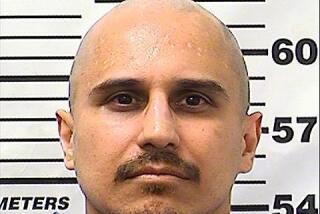Minkow Admits He Faked Attempt on His Own Life
- Share via
Barry Minkow admitted Wednesday that he faked an attempt on his life and filed a false report with police, but said the deception was necessary to get more protection because he was “scared to death of being killed.”
Minkow, the youthful founder of the ZZZZ Best carpet cleaning company who is on trial on 57 counts of securities and bank fraud, admitted that he made up a report last year of a purported roadway shooting incident in the west San Fernando Valley that left two bullet holes in his car.
Minkow, concluding more than four days of cross-examination, also revealed that he returned to cleaning carpets and even worked for a time as a chef in an attempt to make money to pay the “sharks” who were closing in on him after the collapse of his Reseda-based company in mid-1987.
“When all else failed I went out and cleaned carpets. . . . That’s how it started, and that’s how it ended for Barry Minkow,” the 22-year-old defendant testified.
Prosecutors introduced evidence of the phony police report in an attempt to show that Minkow was trying to construct a defense that he was forced by mobsters into committing fraud at ZZZZ Best.
While acknowledging that he faked the incident, Minkow defended the action as a way to get help from police at a time when organized crime figures were after him for money.
“I was real scared in August. There was a lot of things going on,” Minkow said of the Aug. 11, 1987, police report in which he told authorities that someone in a white Lincoln Continental had fired four rounds at his car.
In the report, Minkow said that he and his friend, Anthony Scammardo, were driving in the Santa Susanna Pass when he saw the Lincoln approaching in his rear-view mirror.
The other car pulled alongside Minkow’s and the two men heard shots being fired, Minkow told investigating officers. The officers found two bullet holes in the front fender that appeared to have come from a .38- or .45-caliber weapon.
Under questioning by Assistant U.S. Atty. Gordon Greenberg, Minkow admitted that he had taken his father’s gun and fired the shots into the fender, then threw the gun into the ocean.
The idea came to him, he said, when one of the reputed mobsters who had infiltrated his company, Robert Viggiano, threatened to kill him unless he continued a scheme to inflate ZZZZ Best’s income figures. Minkow alleges that the scheme--which involved pretending that the company was getting tens of millions of dollars from insurance companies to repair flood and fire damage to buildings--was engineered by Viggiano, who has not been charged in the case, and other organized crime figures.
“Viggiano came in and said he was going to kill me. I was scared to death,” Minkow said. “I filed a police report and told them to protect me, somebody tried to kill me. I said to a sergeant at the West Valley station, could you please send a few more squad cars by? I’m really worried somebody’s trying to get me.”
The idea for the white Lincoln Continental, he said, arose because one of the crime figures who had allegedly been threatening Minkow, Jack Catain Jr., a convicted counterfeiter who died last year, drove such a car.
Minkow also admitted under cross-examination that he spent thousands of dollars in ZZZZ Best assets during the waning days of the company and did not report all his assets when he filed for bankruptcy in 1987. Prosecutors argued that the assets should have been preserved to pay back investors who had lost money.
Of the $100,000 Minkow received from the sale of his Ferrari, originally purchased in large part with ZZZZ Best money, more than $31,000 went to his former attorney and $45,000 went to buy three new businesses--a carpet cleaning company, a pesticide service and a waffle restaurant, all of which subsequently failed, he said.
Minkow said he had purchased the businesses in an attempt to generate cash to pay off the mobsters who were still pressuring him for money.
Greenberg concluded his cross-examination by inquiring whether any of Minkow’s dealings at ZZZZ Best were motivated by a desire for personal profit.
“I basically literally became one of these people,” Minkow replied. “The corruption all the time, and dishonesty, on my best day I was borderline . . . but then the motive became to stay alive.”
More to Read
Sign up for Essential California
The most important California stories and recommendations in your inbox every morning.
You may occasionally receive promotional content from the Los Angeles Times.











